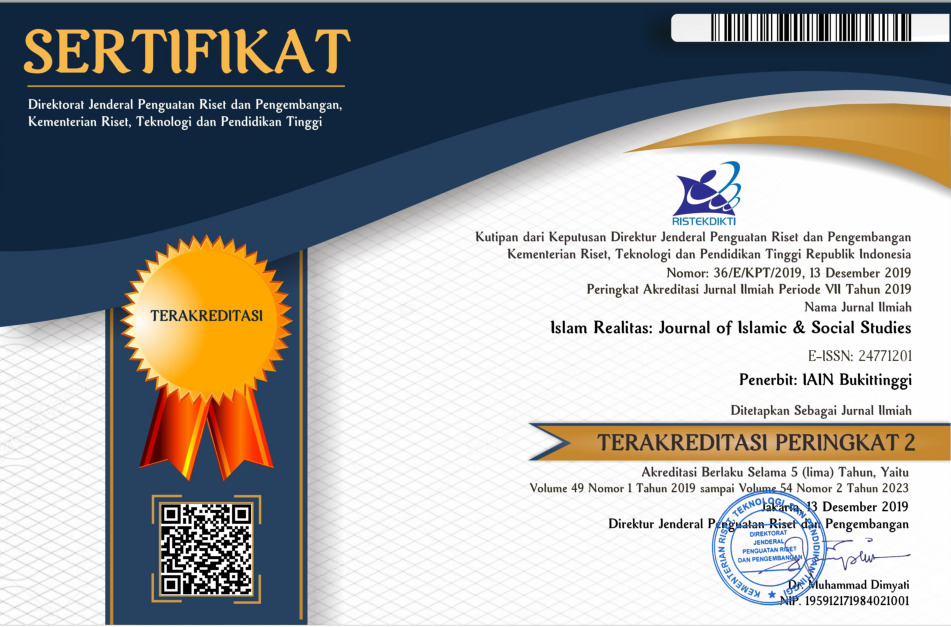The Criticism of the Political Model of Humanitys Twitter NU Garis Lucu Against Intolerant Groups and Government
Downloads
This article examines the criticism of the political model of humanity, namely a critique of the political activities carried out by Twitter NU Garis Lucu against intolerant groups and the government that ignores human values. This twitter displays a style of criticizing and introducing new models of political values on social media, namely through witty sentences and humor across religions, ethnicities, and cultures. This model of politics becomes very important at a time when social sedia is filled with negative and provocative comments and narratives that endanger human values. As a result of this narrative, people are trapped in a rigid understanding, cannot accept differences, and easily judge other Muslims to be wrong when the latters opinions do not align with ones own. This attitude in turn leads to an understanding of identity politics based on religion, one that rejects the teaching and symbols of the state, which are in turn considered contrary to the teachings of the sharia. This research is a descriptive and a qualitative analysis of the many reactions against the NU Garis Lucu twitter handle. The first part relates to the Twitter critique of NU Garis Lucu towards intolerant groups[NP1] . The second relates to the critique that the NU Garis Lucu received with regards to its stance against government and politicians. The results of the study show that the humanitarian politics developed by Twitter NU Garis Lucu by criticizing textual Islamic groups that have the potential to divide the harmony of Islamic society and the birth path of radicalism groups that aspire to uphold Islamic law kaffah. His criticism are manifested in dialogical, witty sentences, with an approach to Islamic teachings that are friendly, tolerant, and accept diversity in religious understanding. He also criticized government policies that were detrimental to the community and politicians who often raised identity politics and ignored its substance in fighting for the interests of the community.
Artikel ini mengkaji kritik model politik kemanusiaan yaitu suatu kritik terhadap kegiatan politik yang dilakukan oleh Twitter NU Garis Lucu terhadap kelompok-kelompok anti-toleransi dan pemerintah yang mengabaikan nilai-nilai kemanusiaan. Twitter ini menampilkan gaya cara mengkritik dan memperkenalkan nilai-nilai politik model baru di Media Sosial, yaitu melalui kalimat-kalimat jenaka dan humor lintas agama, suku, etnis dan budaya. Politik model seperti ini menjadi sangat penting pada saat media sosial dipenuhi komentar dan narasi-narasi negatif dan provokatif yang membahayakan nilai-nilai kemanusiaan. Akibat dari narasi tersebut, masyarakat terjebak pada pemahaman yang kaku, tidak bisa menerima perbedaan, dan mudah memvonis orang Islam lain salah ketika tidak sesuai dengan pemahamanya, yang merembet pada pemahaman politik identitas yang berdasarkan agama yaitu suatu paham yang menolak ajaran dan simbol-simbol negara yang dianggap bertentangan dengan ajaran syariat. Jenis penelitian ini adalah deskriptif kualitatif untuk untuk mengungkapkan hasil temuan. Pertama berkaitan dengan kritik twitter nu garis lucu kepada kaum intoleran. Kedua berkaitan dengan kritik Twitter NU Garis Lucu terhadap pemerintahan dan politisi. Hasil penelitian memperlihatkan bahwa politik kemanusiaan yang dikembangkan oleh Twitter NU Garis Lucu dengan melakukan kritikan atas kelompok Islam tekstual yang mempunyai potensi memecah belah kerukunan masyarakat Islam dan jalan lahirnya kelompok radikalisme yang bercita-cita menegakan syariat Islam secara kaffah. Kritikan-kritikanya diwujudkan dengan kalimat bersifat dialogis, jenaka, dengan pendekatan ajaran Islam yang ramah, toleran, dan menerima keberagaman dalam pemahaman agama. Ia juga mengkritik terhadap kebijakan pemerintah yang merugikan masyarakat dan para politikus yang sering mengangkat politik identitas dan mengabaikan subtansinya dalam memperjuangkan kepentingan masyarakat.
Books
Az-Zuhaili, Wahbah. “Sistem Ekonomi Islam, Pasar Keuangan, Hukum Hadd, Qadzf, Pencurian.†In Fiqh Islam Wa Adillatuhu, 1–742. Jakarta: Gema Insani, 2010.
Dhofier, Zamakhsyari. “Tradisi Pesantren: Studi Pandangan Hidup Kyai Dan Visinya Mengenai Masa Depan Indonesia,†Revisi., 9. Jakarta: LP3ES, 2011.
Engineer, Asghar Ali. “Islam Dan Teologi Pembebasan, Penerjemah; Agung Prihantoro,†33. Yogyakarta: Pustaka Pelajar, 2000.
Munawar-Rachman, Budhy. “Ensiklopedi Nurcholish Madjid,†Pertama., 27. Indramayu, Jawa Barat: Yayasan Pesantren Indonesia Al-Zaitun, 2008.
Wahid, Abdurrahman. “Ilusi Negara Islam Ekspansi Gerakan Islam Transnasional Di Indonesia,†Pertama., 1–325. Jakarta: The Wahid Institute, 2009.
———. “Islamku, Islam Anda Dan Islam Kita Agama Masyarakat Negara Demokrasi,†Cetakan Pe., 1–451. Jakarta: The Wahid Institute, 2006.
Journal
“Abd,†2021. https://twitter.com/Genk_15/status/1444888718418976768?s=08.
Ali Salman, . . Mohammad Agus Yusoff, . . Mohd Azul Mohamad Salleh, . . Mohd Yusof Hj Abdullah, . . “Penggunaan Media Sosial Untuk Sokongan Politik Di Malaysia.†Journal of Nusantara Studies (JONUS) 3, no. 1 (2018): 51–63.
Baidhawy, Zakiyuddin. “Reconstructing the Integration between Islam and Wasathiyyah Based Social Science : An Epistemological Approach.†Millatī, Journal of Islamic Studies and Humanities 6, no. 1 (2021): 35–52. https://doi.org/10.18326/mlt.v6i1.5976.
Busyro, Hanif Aidhil Alwana, Ismail. “Publikasi Mimpi Bernuansa Politis Di Tengah Antisipasi Radikalisme Dalam Kajian Sadd Al-Dzari`ah.†Al-Istinbath 6, no. 1 (2021): 107–26.
Ghozali, Imam. “Memahami Format Demokrasi Model Khawarij Di Indonesia ( Studi Kasus Pemilihan Presiden Tahun 2019).†Islamadina Jurnal Pemikiran Islam 21, no. 1 (2020): 1.
———. “Memahami Format Demokrasi Model Khawarij Di Indonesia ( Studi Kasus Pemilihan Presiden Tahun 2019 ),†2019, 17–25.
Ghozali, Imam, and Junaidi. “Political And Nationalism Of Gp Ansor In Facing The Perssecution Of Kirab Satu Negeri In The Meranti.†Al-Tahrir 20, no. 2 (2020): 307–28.
Ikhwan, M, and Anton Jamal. “Diskursus Hukum Islam Dalam Konteks Keindonesiaan : Memahami Kembali Nilai-Nilai Substantif Agama.†Al-ManÄhij: Jurnal Kajian Hukum Islam 15, no. 1 (2021): 173–86.
Imam Ghozali, Zulfikar Hasan, Chanifudin, Rahaman. “Ideal Country According To Afifuddin Muhajir: Analysis Of The Scientific Speech Of The Hanouris Causa Doctoral Award At Uin Walisongo Semarang Indonesia.†Malaysian Journal For Islamic Studies 5, no. 1 (2021): 27–39.
Khudzaifah Dimyati, Mohammad Busjro Muqoddas dan Kelik Wardiono. “Radikalisme Islam Dan Peradilan :Pola-Pola Intervensi Kekuasaan Dalam Kasus Komando Jihad Di Indonesia.†Jurnal Dinamika Hukum 13, no. 3 (2013): 381.
Mujani, Saiful. “Religion And Voting Behavior Evidence from the 2017 Jakarta Gubernatorial Election.†Al-JÄmi‘ah: Journal of Islamic Studies - 58, no. 2 (2020): 419–50. https://doi.org/10.14421/ajis.2020.582.419-450.
Mukhlis, Febri Hijroh. “Teologi Pancasila: Teologi Kerukunan Umat Beragama.†Fikrah 4, no. 2 (2016): 171. https://doi.org/10.21043/fikrah.v4i2.1885.
Musthofa. “Radikalisme Dalam Islam.†An-Nuha 4, no. 2 (2017): 126.
Nashir, Haedar, Zuly Qodir, Achmad Nurmandi, Hasse Jubba, and Mega Hidayati. “Muhammadiyah’s Moderation Stance in the 2019 General Election.†Al-Jami’ah 57, no. 1 (2019): 1–24. https://doi.org/10.14421/ajis.2019.571.1-24.
“NU GARIS 12 Agustus 2021,†n.d. https://twitter.com/NUgarislucu/status/1434852573303902211?s=08.
“NU GARIS 14 Agustus 2021,†2021. https://twitter.com/NUgarislucu/status/1434852573303902.
“NU Garis Lucu,†n.d. https://twitter.com/NUgarislucu/status/1434852573303902211?s=08.
“NU Garis Lucu,†n.d. https://twitter.com/NUgarislucu/status/1434852573303902211?s=08.
“NU Garis Lucu 1 Oktober 2021,†n.d. https://twitter.com/NUgarislucu/status/1434852573303902211?s=08.
“NU Garis Lucu 30 September 2021,†n.d. https://twitter.com/NUgarislucu/status/1434852573303902211?s=08.
“NU Garis Lucu 4 Oktober 2021.†Twitter, 2021.
Prasetyo, Yogi. “Adab Sebagai Politik Hukum Islam.†Tsaqafah 13, no. 1 (2017): 93. https://doi.org/10.21111/tsaqafah.v13i1.978.
Rahman, Yulia; Ritonga, A. Rahman. “Nationalism and Islam in Religious Learning: Optimization of Insan Kamil Character Building.†Journal of Islamic & Social Studies 7, no. 1 (2021): 42–56.
Salik, Mohamad. “Conserving Moderate Islam in Indonesia: An Analysis of Muwafiq’s Speech on Online Media.†Journal of Indonesian Islam 13, no. 2 (2019): 373–94. https://doi.org/10.15642/JIIS.2019.13.2.373-394.
Septiana, Elis Nugraha, Ridho Al-Hamdi, and Adibah Dhivani Gusmi. “Aksi 212 Dan Kemenangan Anies-Sandi Pada Pemilihan Gubernur Jakarta 2017.†JISPO Jurnal Ilmu Sosial Dan Ilmu Politik 10, no. 2 (2020): 1–20.
Siregar, Christian. “Pancasila, Keadilan Sosial, Dan Persatuan Indonesia.†Humaniora 5, no. 1 (2017): 107–12.
Supriadi, Endang. “Membangun Spirit Kebangsaan Kaum Muda Di Tengah Fenomena Radikalisme.†Sosiologi Agama 11, no. 1 (17AD): 1–12.
Syahputra, Iswandi. “Activities on Twitter and the 212 Defend Islam Rally Through the Perspective of the Indonesian Ulema.†Al-JÄmi‘ah: Journal of Islamic Studies 58, no. 2 (2020): 323–54. https://doi.org/10.14421/ajis.2020.582.323-354.
Syam, Nur, and Nawawi. “Islam Nusantara Berkemajuan Sebagai Basis Moderasi Islam Di Indonesia.†ISLAMICA: Jurnal Studi Keislaman 13, no. 2 (2019): 236–55.
Wahyudin. “Religious Interpretation On Pancasila Methodologically And Empirically In Implementing Islamic Insight In Indonesian Archipelago.†Akademika 24, no. 01 (2019): 1–24. https://doi.org/DOI: http://dx.doi.org/10.32332/akademika.v24i1.1377 Religious.
Wanto, Adri. “The Paradox Between Political Islam and Islamic Political Parties: The Case of West Sumatera Province.†Al-Jami’ah: Journal of Islamic Studies 50, no. 2 (2012): 329. https://doi.org/10.14421/ajis.2012.502.329-368.
Yusuf, Mundzirin, and Hendro Widodo. “Islam Berkemajuan Dalam Perspektif Muhamadiyah.†ISLAMICA: Jurnal Studi Keislaman 13, no. 2 (2019): 185–208.
Copyright (c) 2022 Imam Ghozali

This work is licensed under a Creative Commons Attribution-ShareAlike 4.0 International License.
Authors who publish with this journal agree to the following terms:
- Authors retain copyright and grant the journal right of first publication with the work simultaneously licensed under a Creative Commons Attribution License that allows others to share the work with an acknowledgment of the work's authorship and initial publication in this journal.
- Authors are able to enter into separate, additional contractual arrangements for the non-exclusive distribution of the journal's published version of the work (e.g., post it to an institutional repository or publish it in a book), with an acknowledgment of its initial publication in this journal.
- Authors are permitted and encouraged to post their work online (e.g., in institutional repositories or on their website) prior to and during the submission process, as it can lead to productive exchanges, as well as earlier and greater citation of published work (See The Effect of Open Access).









